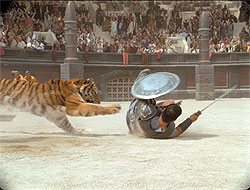|
Civil wars
 When Caesar was in Gaul and organized the conquered territories, Pompey and Crassus tried to enlarge their power too. Pompey was successful: in 52, he was elected "consul without colleague", and he yielded dictatorial authority. Crassus, however, was unfortunate: after his consulship, he became governor of Syria with special prerogatives, and was defeated by the Parthians, who lived in modern Iraq. They murdered the Roman general by giving him what he had desired most, gold: the precious metal was liquified and poured into his mouth.
When Caesar was in Gaul and organized the conquered territories, Pompey and Crassus tried to enlarge their power too. Pompey was successful: in 52, he was elected "consul without colleague", and he yielded dictatorial authority. Crassus, however, was unfortunate: after his consulship, he became governor of Syria with special prerogatives, and was defeated by the Parthians, who lived in modern Iraq. They murdered the Roman general by giving him what he had desired most, gold: the precious metal was liquified and poured into his mouth.
After Crassus's death, Pompey and Caesar remained, and the Senate feared a civil war, from which a king would arise. An overwhelming majority in the Senate (400 against 22) wished both dynasts to lay down their extraordinary commands before the consular elections in December 50. (The question if this was lawful remains unanswered: in 52, the People's Assembly had allowed Caesar to run for consul without being present.) After some deliberations, Pompey obeyed the Senate.
He was in a better position than Caesar. If the latter obeyed, he was no longer immune to prosecution. Cato had charged him with war crimes in Germany, and many people remembered Caesar's first consulship and the Spanish War. If Caesar refused to obey, he would be declared an enemy of the state: the Senate would be forced to appoint a commander with plenary powers, and it was not hard to see who this general would be.
In 49, on January 7, the Senate demanded Caesar to hand over his ten well-trained legions to a new governor. Caesar heard the news in Ravenna, and knew that he had to make a choice between prosecution and rebellion: preferring the dignity of war over the humiliation of a process, Caesar chose to rebel, quoting his favourite poet Menander, "the die is cast". On January 10, his army advanced to Rimini, where Caesar could control the passes across the Apennines: in doing so, he crossed the river Rubico, thereby invading Italy and provoking the Second Civil War. Caesar's perspectives did not look great: nine of his legions were in Gaul.
As it turned out, the Senate had made a disastrous mistake. It had believed that the issue was between a rebel and the legitimate rulers, and had expected that the towns of Italy would send troops in defence of the authority of the Senate and the Roman People's liberties. But Italy was sceptical about its champions, and showed no enthusiasm to defend the constitution. For Caesar's soldiers, on the other hand, everything depended on this one campaign: if they failed, they would never receive their pension. Unable to raise armies, the Senate was helpless. Two weeks after the start of the Civil War, Caesar was master of Italy and had hunted his enemies to the heel of Italy, from where Pompey and many senators fled to Greece.


|